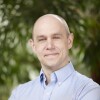Engaging with Your Community

Sigma Pi Sigma was founded in 1921, and I would like to think that its founders would have been pleased to see how the linked societies we know today as Sigma Pi Sigma and the Society of Physics Students have spread widely and yet remained focused on supporting the next generation. The society’s founders at Davidson College’s alpha chapter, its original label, included both faculty and students. This sense of shared ownership between students and professionals permeates the way we continue to govern ourselves and are supported by the American Institute of Physics. Through national elections, the physics congresses, and a strong collaboration with professional societies that Sigma Pi Sigma members can participate in, the society remains relevant and connects us together as lifelong physical scientists.
A lot has changed within the community over the past 98 years. Physics, the way we learn physics, and Sigma Pi Sigma have evolved with the times. This issue of Radiations highlights some of that evolution, with our features focusing on “empowering the next generation,” which can be interpreted in many different ways but gets to the heart of the Sigma Pi Sigma mission. Our field is a lens by which we can focus on the solutions we need to help each other thrive. The stories we share within this issue can help us consider the many facets of where we have come from, what it means to contribute to our society, and where we want to go as a community. These topics are mirrored in many of the program elements Sigma Pi Sigma hosts to support students, members, and the community.
Very recently I was reminded of how our past and ideals help to shape our future by one such program: the SPS internship program. I was able to watch 16 of the best and brightest students from across the country discuss science policy legislative processes on Capitol Hill, the history of diversity in the physical sciences, expanding bachelor’s degree career options, cutting-edge research and policy at national labs, and everything in between. It was an amazing window into how the newest members of our community own not just the field’s newest developments but the wide variety of places physicists can make a difference. Our history and traditions are the foundation upon which the future of the field will be built.
Our past traditions and future aspirations will be on full display at the upcoming 2019 Physics Congress. I hope that you have already made plans to join us November 14–16, 2019, in Rhode Island, but if not, on behalf of the SPS/Sigma Pi Sigma Executive Committee, I want to formally extend an invitation. This event is hosted by Sigma Pi Sigma and stems from the first national convention of Sigma Pi Sigma in 1928 at Davidson College. If you are not able to attend in person, please join us on November 16, 2019, as we livestream plenary talks by Dr. Jami Valentine-Miller and Dr. John Mather.




